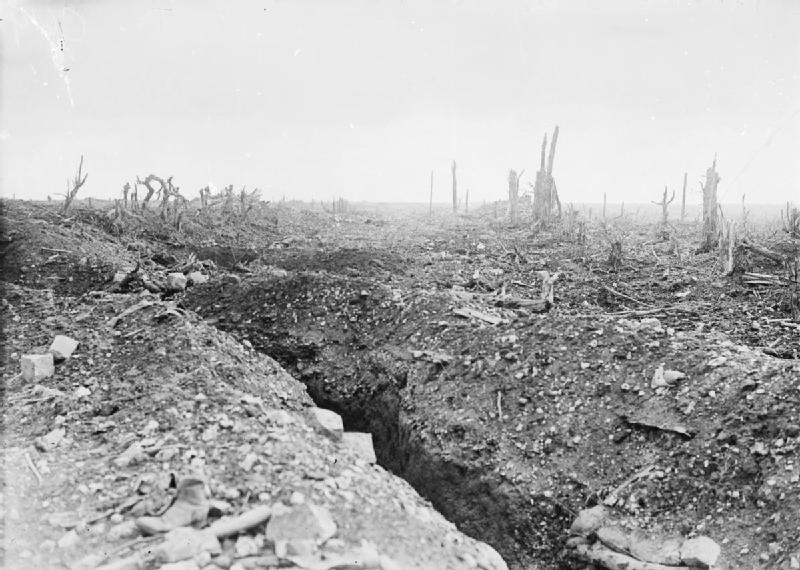Nightmares and dreams of World War I
- By Heiko Khoo
 0 Comment(s)
0 Comment(s) Print
Print E-mail China.org.cn, August 2, 2014
E-mail China.org.cn, August 2, 2014
|
|
|
The badly shelled main road to Bapaume through Pozieres during the battle of the Somme from July 1 to November 18, 1916. [photo: wikipedia] |
The 100th anniversary of World War I has arrived. It stalked its way into our minds like a grey misty fog assuming a ghostly form. Its haunting shadows seep slowly and imperceptibly into our collective subconscious. Photographs in black and white act as our witness and guide, offering us dreamscapes to color in with paintings and poems of the wastelands that conquered civilization, modernity and progress. If people today could travel back in time a hundred years, they would find their feet in that world with little difficulty. The fundamental economic, technical, political and cultural building blocks of our time were already well established.
The father of psychoanalysis, Sigmund Freud, explained that in the human psyche, the child is the parent of the adult. So, the traumas, hopes and dreams of World War I shaped the collective psyche of us all -- the children of the scientific age. In this sense, the generation that lived through that war are the collective parents of us all. Nightmares anchored in the human consciousness at that time remain our everyday companions; and the revolutionary awakening that shattered the war, continues to inspire our actions.
Were recent events in Gaza, Iraq and Ukraine the epic opening of a theatrical World War I centennial event, this would have been a fitting historical reminder. But alas, it appears that they serve some other function. On the surface they materialize as unique and specific conflicts driven by immediate causes: outrage at the killing of Palestinians or Jews, in and around Gaza; the sudden rise of a new armed Islamic fundamentalist movement in Iraq; and the distinctive peculiarities of a clash of nationalist sentiments and loyalties in Ukraine. Yet the eerie presence of historical phantoms hovers like dark clouds over these events. Why does the crisis in Ukraine draw in Europe, the United States, Russia and the world? Why does the greatest historical tragedy of the Jews, the holocaust of World War II, inspire some Jews in Israel to cheer at the spectacle of missiles killing innocent children in Gaza? And, why does Gaza resemble a concentration camp?
Observers present at the outbreak of war in 1914 recalled the sense of excitement and eagerness to see in the new. Millions sensed that they were participants in grand events shaping human destiny and sweeping away the mundane and the normal. The accumulated power of science, culture and industry, which capitalism had unleashed, was but the combined materialized energy of the hands and brains of workers everywhere. The capacity of capitalism to revolutionize all aspects of human life was transformed into the ability to muster the accumulated skills, intellect and materials, produced throughout history, for the mission of universal destruction. Women's lives were transformed, as their energies were thrown into the production of guns and missiles -- for their loved ones to slaughter the loved ones of others -- in the name of their motherland or fatherland.
And war is the mother of revolution. The destruction and slaughter heralded multifaceted revolutionary change. It recast the map of the world: provoked revolutionary uprisings in Russia, Germany and Hungary; empowered women to demand equality with men; provoked anti-imperialist struggles in China, India, Africa and the Middle East; and gave birth to the world communist movement. Yet these positive signs of an awakening and global consciousness of the masses were reversed. The next slaughter grew organically from the contradictions built into the world order established on the ruins in 1918, by the great capitalist powers. The imperialist system of colonial dominance demanded its continued right to organize and plunder the world.
The trenches of Flanders and France saw the tragic and senseless loss of millions of lives. Naturally this still fascinates and engages people today. As I write these words, a television news broadcast shows plumes smoke over shelled buildings, ruins, screaming mothers with their hands in the air, others clutching their dead children, while rocking back and forth. As long as mothers holding children must scan the skies for the inventions of man, the legacy of World War I remains alive, lest we forget that war was a battle for markets, profits and power. The beast that gave birth to it remains a real and present danger to us all.
The author is a columnist with China.org.cn. For more information please visit: http://china.org.cn/opinion/heikokhoo.htm
Opinion articles reflect the views of their authors, not necessarily those of China.org.cn.







Go to Forum >>0 Comment(s)